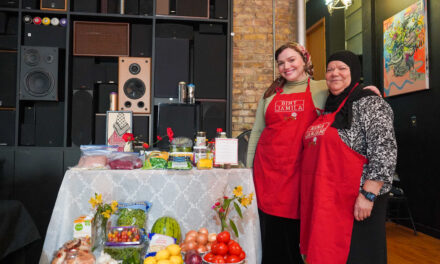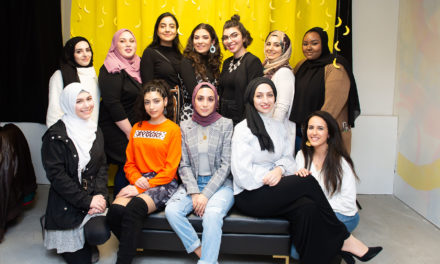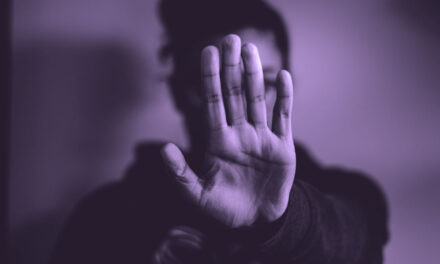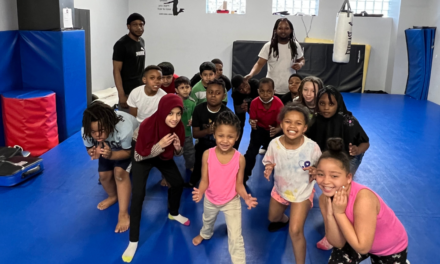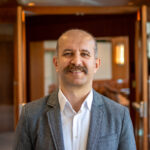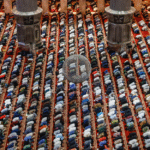This article is the second in a series reporting highlights from the MMWC Mental Health Conference. See the first article here.
“When we talk about domestic violence, people automatically assume Muslim women are being controlled, especially those of us who cover their head,” Dr. Farha Abbasi said at the Milwaukee Muslim Women’s Coalition’s first mental health conference, held in Brookfield Sept. 18-19. “We hear this constantly: Is your husband or your brother or your father mistreating you?
“When it comes to Muslim women, the narrative we hear all the time is that we need to empower and rescue Muslim women, even to the point that we went to war.”
Dr. Abbasi, assistant professor in Michigan State University’s Department of Psychiatry and a core member of the university’s Muslim Studies Program, was a featured speaker at MMWC’s two-day conference that brought together national and local behavioral health experts to address the unique needs of Muslim patients. It was the first conference of its kind in Wisconsin.
Held at the Insight Life Learning Institute, 13780 Hope St., Brookfield, MMWC’s mental health conference was funded through a grant from the Wisconsin Department of Health Services. The Medical College of Wisconsin approved 9.5 Continuing Medical Education (CME) credit hours for attendees at no charge.
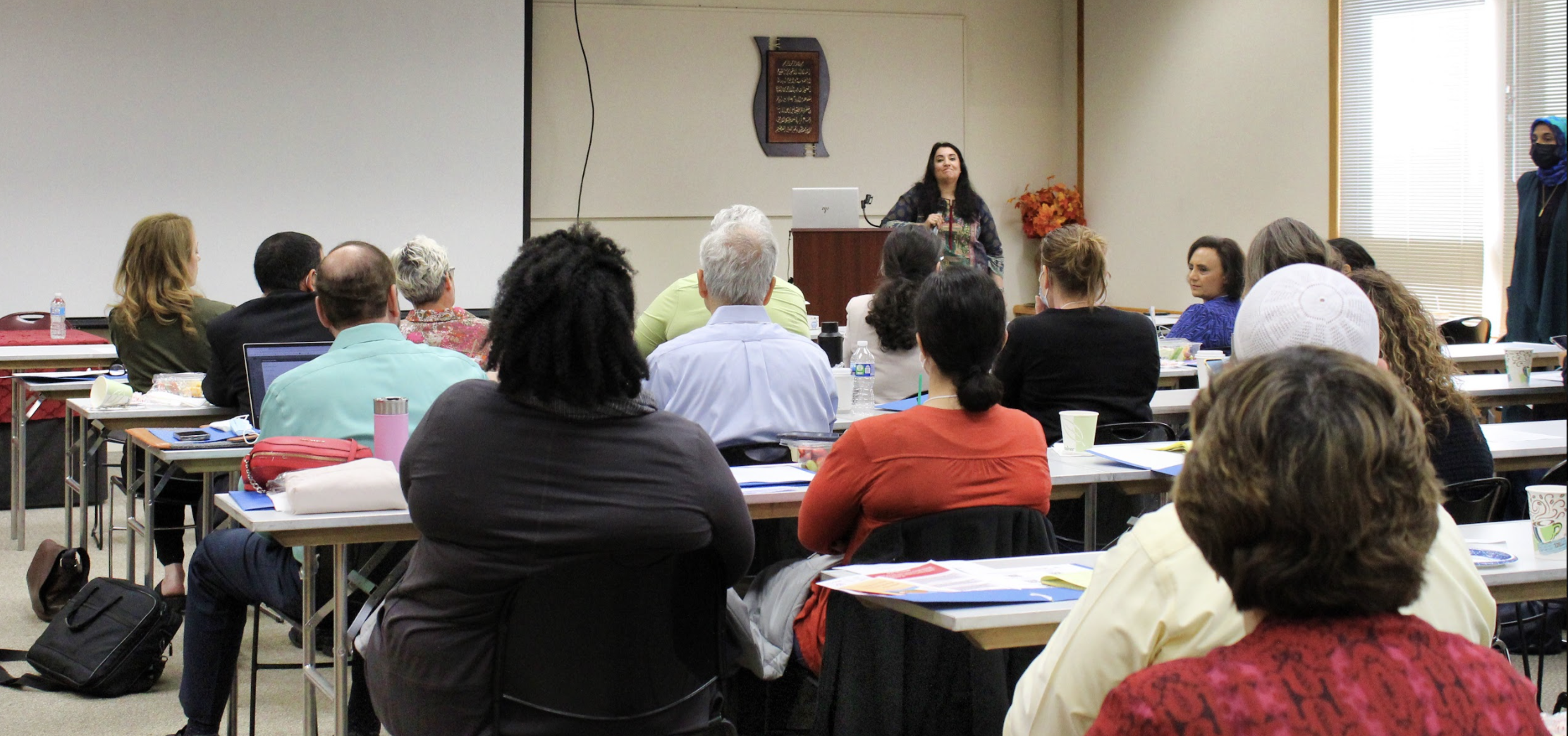
“The need for a consistent, culturally specific approach for dealing with the connection between domestic violence and mental health issues has been a key motivator for creating this conference,” MMWC founder and president Janan Najeeb said. This conference “is geared towards understanding Muslims and to learn how to work with Muslim populations, to be culturally compassionate and understand where individuals are coming from.”
Three years ago, MMWC launched Our Peaceful Home, a culturally specific program to assist individuals experiencing domestic violence. “We are hopeful in the next few years we will be able to open a shelter,” Najeeb said. “Our women do not do well in the general shelters and that’s a huge problem. It’s something they don’t really understand. Also, shelters do not accommodate some of their needs. It’s a miserable situation but a miserable situation you recognize is better than a miserable situation you don’t recognize.
“Our whole purpose behind this conference is to create a team and we would like you to be on this team,” Najeeb told conference attendees.
Understanding domestic violence
As a cultural psychiatrist who focuses on domestic violence, Dr. Abbasi decided to pursue a personal journey to understand domestic violence through the lens of her identity and religion, she said. This journey led her to separate what Islam teaches about the role of women from beliefs that have been passed on through culture that pre-dated Islam.
“We need to broaden our understanding of domestic violence. It can happen to anyone. It transcends race, gender and religion. It is pervasive in our society,” Dr. Abbasi said. “We all know it is a moral, ethical and social failure from an individual to a community to society.
“The United States Department of Justice defines domestic abuse as: ‘A pattern of abusive behavior in any relationship that is used by one partner to gain or maintain control over another intimate partner.’
“There is no cookie-cutter definition,” she explained. “It is a form of oppression that could be verbal, mental, physical, sexual, emotional, social, spiritual and economic. It could be spiritual also. We have seen faith leaders become abusive. It causes fear and harm to the body, mind and spirit.
“It can happen at home or outside the home. While we always hear the complaint that men can be victims, too, the numbers show that women are more vulnerable.
“Since the COVID-19 pandemic began, we are seeing a big crisis to the point that the United Nations is talking about the pandemic of domestic violence,” Abbasi said. “I was doing this work in Pakistan where 5,000 women get maimed or killed each year and the most dangerous area is at home for them. When COVID hit, the victim and perpetrator were put in one location. Those are just the reported cases. We know it is underreported. It is very pervasive.”
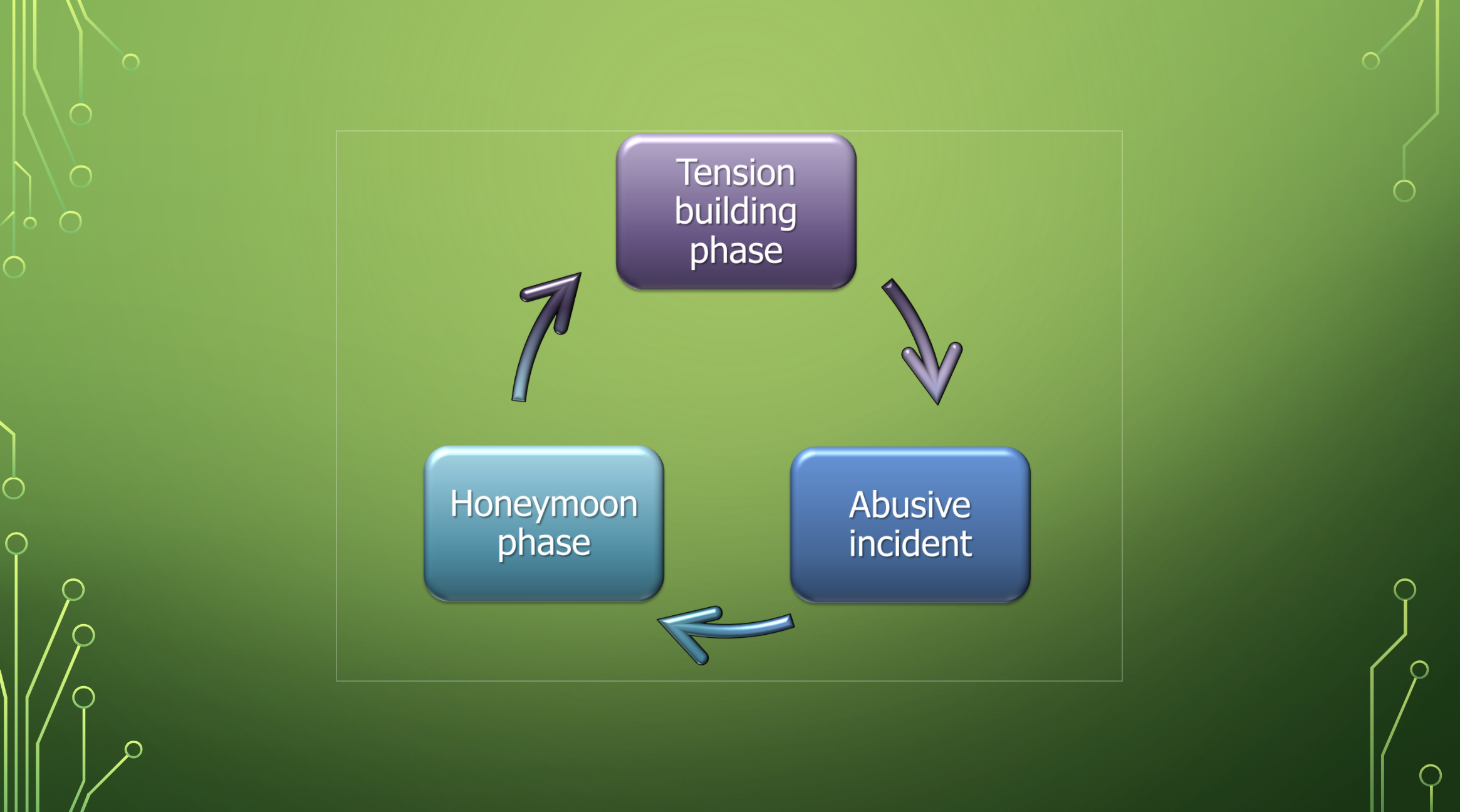
Mental health and domestic abuse
“As a mental health provider, I see it is important that we address domestic violence and understand it. It doesn’t impact just one person: it affects the victim, the perpetrator and children.
“Women experiencing domestic abuse are more likely to experience a mental health problem, such as anxiety, PTSD, substance abuse or suicide,” Dr. Abbasi said. “At the same time, women with mental health problems are more likely to be domestically abused. From 30-60% of women with mental health problems have experienced domestic violence.
“Exposure to domestic violence and abuse also hurts children’s self-esteem. They may not participate in school activities or get good grades. They tend to isolate themselves and have difficulty making friends. They are more likely to get into trouble more often and they also may have a lot of headaches and stomachaches.”
Understanding Islam’s teachings
Dr. Abbasi said though she is not a theologian she has reflected on the Qu’ran’s teachings about the relationship between men and women, and in her personal reflections she sees that Islam treats men and women equally. “While men and women have very specific roles one is not superior to the other; they are complementary to each other.
“Both are required to follow the same laws. Both are supposed to dress modestly, to meet the same standards and they are equal in God’s eyes. It is not automatic that men are going to heaven and women have to work hard to go to heaven.”
She quoted the following verses:
“The most noble of you in the sight of Allah is the most righteous of you. (49:13)
To whoever, male or female, does good deeds and has faith, We shall give them a good life and reward them according to the best of their actions.” (16:97)
“Just based on your deeds, your intentions, your behavior you are being evaluated, not on your gender,” she said. Islam calls for a “mutually beneficial, interdependent relationship.”
Women have a central role in Islam and it is a blessing to be a woman in Islam, she added. “Quranic verses advise men to nurture and protect women. It does not say to control them.”
Islam is a religion that talks about peace as its main concept—to be at peace within yourself and at peace within your environment, Dr. Abbasi said. It is not logical that this message could condone domestic abuse.
To understand the Quran, Muslims look to the life of the Prophet Muhammad (pbuh), she said. “The Prophet’s life is defined by strong, loving women around him. He personifies the ideal husband who is helping the wife at home, who is playing with the wife, spending quality time at home, sharing with household chores, sharing in raising the kids.
“There is not one incident of the Prophet being violent to his wives or trying to control them. I never see a narrative where one of his wives had to go and ask his permission to do something. What I see is that things are being discussed and talked about with each other.”
Women are respected in Islam, Dr. Abbasi noted. “The biggest historian who collected most of the hadiths was one of the wives of the Prophet. Women engaged in commercial transactions were encouraged to seek knowledge and were both instructors and pupils in the early Islamic period. Islam highly valued education for men and women.
“Also in the Islamic law, domestic violence is addressed under the concept of haram (darar), as is a husband’s failure to provide obligatory financial support (nafaqa) for his wife, along with the absence of the husband from home, the husband’s inability to fulfill his wife’s sexual needs or any mistreatment of the wife’s family members.
“We think of feminism and women’s empowerment as a Western concept. What I see when I look at American history is that women weren’t accepted as full citizens in the 1920s. In America, in the 1930s, we see a spike in policies and laws that discriminated against women, with nine states even forbidding them to work after they married. Islam gave women the right to work 1,400 years ago and their status does not change when they get married.”
Women could require their husbands to sign prenuptial agreements from the time of the Prophet, she said. In these legal agreements, women could enforce their right to divorce, to maintain custody of their children, to wear a head covering or not to wear a head covering, the right to be the one and only wife of her husband and other issues that concerned her, she explained.
Remnants of culture
“I’m not saying that it is all better in Muslim countries,” Dr. Abbasi continued. “As soon as the Prophet passed away, we start seeing policies come back of controlling women and changing interpretations of Islam.
“The cultures where Islam is practiced got mixed in with Islamic interpretations. These cultural practices pre-date Islam,” she said.
To help her audience understand how Islam is different from culture, Dr. Abbasi asked them to consider the series “Game of Thrones.” The show reminds her of the Jahiliyyah, the period in Arabia before the advent of Islam called “the age of ignorance.”
“Like in Game of Thrones, women were treated like a piece of property. In contrast, Islam gave full personhood to women, an identity. It prohibited female infant infanticide and gave women the right to own property and to divorce. When you get married, you don’t have to take your husband’s name; you are entitled to your own name and identity.”
Abbasi noted there have been some Quranic verses have been misinterpreted to defend the hitting of wives as punishment in some cultures. Yet, many Islamic scholars, men and women, have shown the Arabic words have multiple meanings that contradict that interpretation.
“What I see is that men were given superior strength and endurance so they can nurture, advise, guide and protect women, not so they can control them. Marriage in the Islamic concept is a means of tranquility, protection, peace and comfort,” she said.
“You have the option. You can have the violence happen or you can have the kindness happen. Each one of us can participate and contribute with that.”
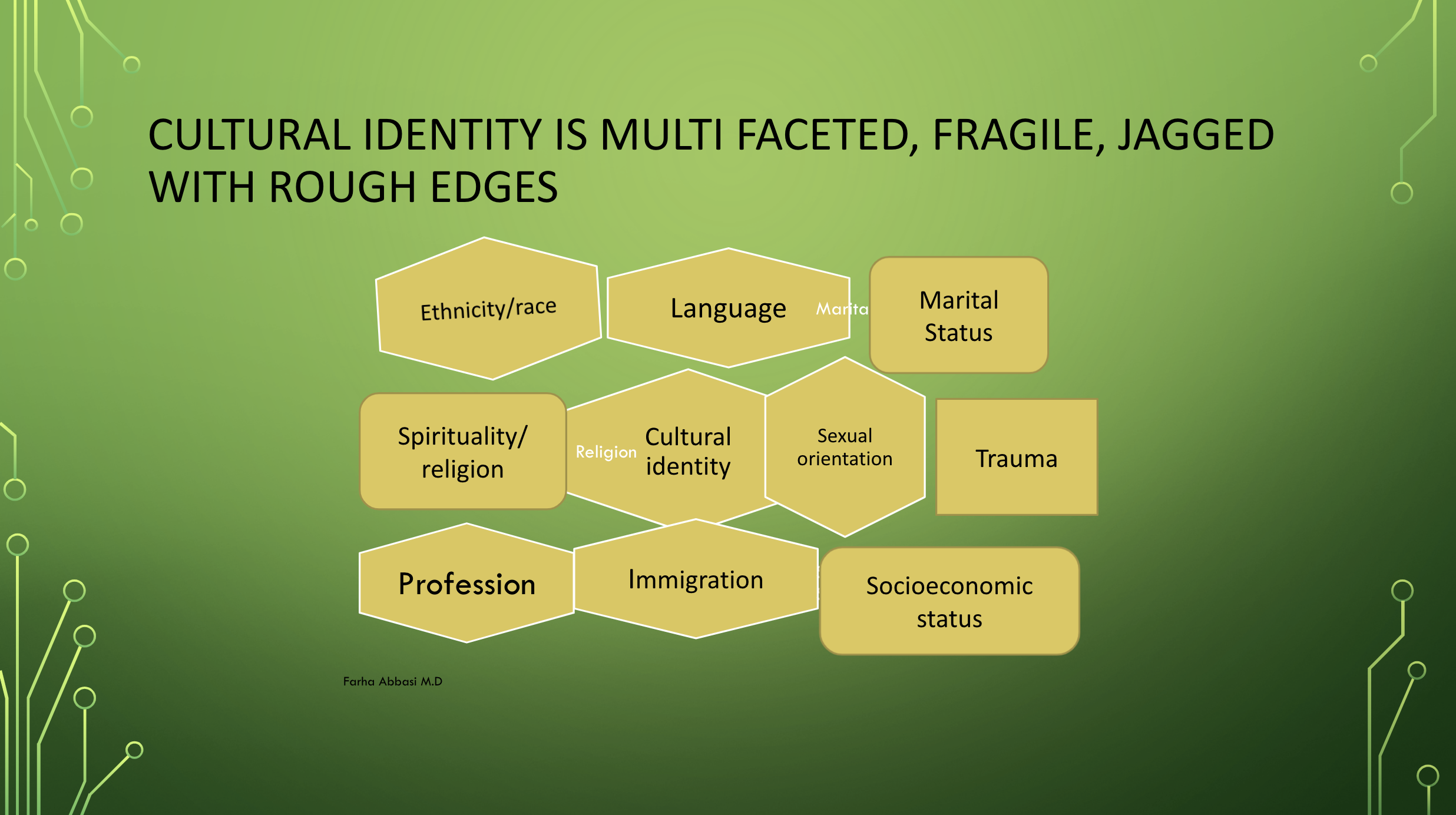
Creating a supportive society
Many cultures do not support women who are in abusive relationships, Dr. Abbasi noted. “From when you are a young girl, you hear from your family they hope you will be happily married. You hear that all the happiness will come after you are married. When you go to your husband’s house, you will be free to get your education, you will be free to travel, to do whatever you want. That might not be the reality.
“You may also belong to a society where the only way out of marriage is death. The narrative I often hear is ‘Stay in it for the children; your children need a father.’ Our cultures put the onus on the woman to make the marriage work. When the marriage fails, we tell the woman she failed. So, leaving an abusive partner is a very difficult thing to do.
“Toxic homes are more detrimental to the kids than single-parent homes. We have to stop calling single-parent homes ‘broken homes.’
“This is the message: it is not one religion or one culture or one thing that is perpetrating domestic violence. It is a societal problem,” she said. That is why it will take our joint efforts to address it.
Dr. Abbasi is the founding director of the annual Muslim Mental Health Conference, a national and international conference now in its 14th year. It will be held March 25-26 at Yale University and online.
To watch the Mental Health Conference, click on these links:

